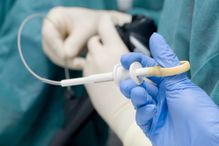
Has you doctor ever ordered a biopsy to further explore a concerning finding on an imaging test? Unfortunately, many patients are nervous about this basic diagnostic procedure, even though they are quite safe, effective, and accurate. Here is a little more information about biopsies and what you should expect.
Understanding Biopsies
What Is a Biopsy?
 Simply put, a biopsy is a way for physicians to collect a very small amount of tissue for diagnostic testing. After the tissue is collected, your doctor will send the sample to pathologists who will use a variety of methods to figure out what is causing the problem. Typically, samples are cut into incredibly fine slices and then analyzed under powerful microscopes so pathologists can decide whether the tissue is cancerous or benign. Although most parts of the body can be biopsied, the most common areas biopsied are the skin, breast tissue, bone marrow, intestinal tract, liver, lungs, prostate, cervix, and brain.
Simply put, a biopsy is a way for physicians to collect a very small amount of tissue for diagnostic testing. After the tissue is collected, your doctor will send the sample to pathologists who will use a variety of methods to figure out what is causing the problem. Typically, samples are cut into incredibly fine slices and then analyzed under powerful microscopes so pathologists can decide whether the tissue is cancerous or benign. Although most parts of the body can be biopsied, the most common areas biopsied are the skin, breast tissue, bone marrow, intestinal tract, liver, lungs, prostate, cervix, and brain.
What Should You Expect?
Depending on where the area of concern is, your doctor might conduct the biopsy in his or her office or admit you to the hospital to have the biopsy performed under general anesthesia. If you are having an in-office biopsy, you should expect to receive a few shots to numb the area before the tissue is collected. Patients who receive biopsies typically report soreness or tenderness around the biopsy site, although most symptoms are treatable with over-the-counter pain relievers. If you have a more invasive biopsy, the procedure may need to be performed in a hospital.
Hudson Valley Imaging in Monroe, NY, offers a wide variety of diagnostic tests to help patients get the highest level of medical care available. From biopsies and CT scans to digital mammography and fluoroscopy, their team of radiologists will do everything in their power to diagnose your medical issues quickly and accurately. To learn more about their services, explore their webpage or call (845) 220-2222.
About the Business
(21 reviews)
Have a question? Ask the experts!
Send your question

